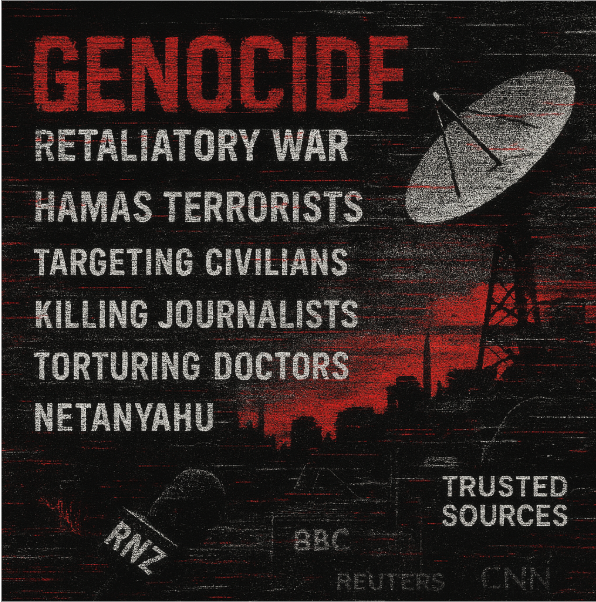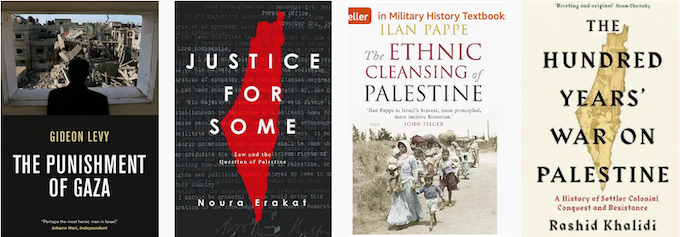ANALYSIS: By Jeremy Rose, Eugene Doyle and Ramon Das
Radio New Zealand’s decision to conduct a review of its Israel-Palestine coverage post-7 October 2023 is commendable. It commissioned Colin Feslier, an experienced and respected communications expert to undertake this work.
Feslier delivered his report in March 2025. His brief was to assess complaints against the various standards, principles and codes, monitoring coverage outside this, and suggesting actions for improvement.
Feslier has a long and close affiliation with Radio New Zealand. His remuneration, time allocation, and RNZ’s own requirements of him may have constrained the scope of his work.
However, the report, as presented, we believe, does not meet a credible standard in terms of breadth, methodology and analysis. Unfortunately, the result — an assessment that the broadcaster was almost unswerving in meeting journalistic codes and standards — fails to do justice to the issue on numerous counts.
- READ MORE: UN rejects US-backed Gaza aid plan, citing lack of neutrality
- Other Israel’s War on Gaza analysis media reports
- Special Pacific Journalism Review edition on ‘Gaza, genocide and media: Will journalism survive?’

Given its self-limiting scope and its conclusions (which we do not agree with), the report risks appearing to be a quick sanitising exercise that ended in a predictable finding of, “Nothing to see here; you’re doing a great job.”

Why deeper analysis is required
The issue of bias in Radio New Zealand’s coverage of the Israel-Palestine conflict is too important to leave at that. The Israel-Palestine conflict touches both the credibility of the national broadcaster and our country’s tangential connection to major ongoing war crimes that many experts categorise as a textbook case of genocide.
Missing the forest for the trees
Its most glaring failure is not to see the forest for the trees. By concentrating on complaints about individual stories and claiming that balance is achieved over time it avoids tackling the most serious complaint that RNZ has failed to cover the unfolding genocide in Gaza with anything like the attention it demands.
The report lacks any quantitative analysis, any comparison with coverage by other public broadcasters, and doesn’t tackle the question of whether enough attention has been given to what human rights groups like Amnesty International, Israel’s B’Tselem and Human Rights Watch, as well as leading academic authorities, have called an ongoing genocide.
Similarly, it fails to note an alarming absence of Palestinian voices in its coverage since 7 October 2023. Nor does it interrogate the reasons why Israeli and Palestinian voices are not given equal weight.
Remedying the inadequacies of the report is beyond the scope of this article but even a cursory look at the evidence suggests a far more rigorous investigation is needed.
Genocide avoidance on RNZ
The very first principle of the Media Council Principles (“Accuracy, Fairness and Balance”) states that broadcasters are not to “mislead or misinform readers by commission or omission.” In other words, the Principles explicitly recognise a positive duty to inform the public on matters that are in the public interest.

RNZ’s sparse and incomplete coverage of the Israeli genocide has, we submit, clearly failed to meet this positive duty to the public.
In November 2023, leading holocaust and genocide scholar Omer Bartov — an Israeli citizen — wrote a New York Times op-ed claiming Israeli leaders from the president and PM down were expressing genocidal intent. He has since become one of many prominent genocide scholars to say Israel has gone from expressing intent to carrying out a genocide.
The Australian Broadcasting Corporation interviewed Bartov after his initial essay claiming there was genocidal intent was published, and he’s had two in-depth interviews since. Bartov has not appeared on Radio New Zealand since 2009.
The claim by leading human rights groups, genocide scholars, distinguished Israeli historians, such as Avi Shlaim, that a genocide is ongoing is unprecedented and has focussed the world’s attention on the issue of genocide like never before. South Africa taking a case to the International Court of Justice (ICJ), now supported by a growing number of countries, adds great weight to the issue.
A search of RNZ’s audio returns just one interview on the topic: a 7-minute interview on Checkpoint with Amnesty International Aotearoa campaigns director Lisa Woods.

Absence of Palestinian voices
News items regularly feature either IDF spokespeople or clips of Prime Minister Benjamin Netanyahu (wanted by the International Criminal Court on war crimes charges) but almost never clips of either Hamas or Palestinian Authority spokespeople.
The absence of feature interviews with either Palestinians or Israelis is a striking aspect of the last 19-months of coverage.
Rashid Khalidi, the author of The One Hundred Year War on Palestine, is a leading US-based Palestinian intellectual who has appeared on numerous media outlets since 7 October 2023, including twice on the ABC and once on RTE — but not once on RNZ.
He is, of course, just one example, and there are numerous other Palestinian and Israeli intellectuals and politicians who could provide useful context.
On two occasions when local Palestinians were interviewed, they were paired not with Israelis but Jewish New Zealanders
Crimes against Palestinians given less weight
The RNZ report refers to a listener’s complaint that BBC reports carried by RNZ are biased. In response it recommended that RNZ dedicate a section of its website explaining its choice of sources and why it trusts them.
It failed to note that more than 100 BBC staff as well as prominent historians and academics had raised similar concerns about the public broadcaster’s lack of balance in its coverage of Israel Palestine in an open letter published last November.
We are not suggesting RNZ ditch the BBC; but relying so heavily on a select few outlets, that may themselves lack balance when it comes to the Israel-Palestine conflict, is more likely to amplify a lack of balance than lessen it.
Some lives matter more than others
Establishing for a fact that less weight is given to the suffering of one group than others is extremely difficult but there’s reason to believe that this is the case in RNZ’s Palestine coverage.
To take just two recent examples. On Monday 14 April Morning Report ran a six-minute item on a Russian attack that killed 34 Ukrainian civilians. Israel’s attack on the last hospital left standing in Gaza the day before didn’t rate a mention.
According to Al Jazeera an average of 62 Palestinians were killed each day between March 18 and April 12. During that same period Morning Report ran just two stories on the bombing of civilians in Gaza totaling 9 minutes 42 seconds.
On Monday, May 5, the RNZ’s website ran a lengthy Reuters report and a Checkpoint report on a Houthi missile strike on Ben Gurion airport. A US strike on Yemen a week earlier that resulted in the killing of 68 civilians went unreported. This should be of interest to our national broadcaster as New Zealand has military targeting specialists working in the Red Sea to support the US-Israeli campaign against Yemen’s Houthis.

Israelis are ‘people like us’. Palestinians are not?
One of the more revealing parts of the report notes that the journalistic concept of “proximity” may influence RNZ’s news judgement. In essence the idea is that journalists give greater weight to a bus crash in their own city than to one on the other side of the world.
The report claims that: “Israel, as a result of tourism, trade, ‘western’ alignment and language (with English a common first and second language there) have a greater ‘news proximity’ to New Zealand than do Palestinians and Palestine. Stories may be chosen for these reasons and the inevitable result is a stronger perception of news relevance of Israeli stories. Coverage of stories with a Palestinian angle will tend to be less often reported. This tendency needs to be recognized.”
If that “tendency” has been in play in RNZ’s news judgement it has to be more than “recognised” it needs to be properly investigated and stamped out. The implication that RNZ listeners care more about the life of an Israeli baby than a Palestinian one is abhorrent.
But, having flagged that possibility, the report then fails to investigate whether RNZ’s coverage has favoured Israeli stories over Palestinian ones and simply recommends that the public broadcaster recognises the risk. This is unacceptable.
There is, as it happens, a stark illustration of RNZ providing more airtime to an Israeli spokesperson justifying the war crime of bombing a hospital than a leading UN expert on the war crimes being committed in Gaza.
In November 2023, Francesa Albanese, the UN Special Rapporteur on the Palestinian Territories, visited New Zealand. Her only appearance on RNZ to date was an interview of under a minute on Morning Report during her nationwide tour.

The 3 minute 52 second item consists of almost two minutes of IDF spokesperson Mark Regev justifying Israel’s bombing of the Al Shifa hospital followed by less than a minute of Albanese.
Normal practice would be to give more airtime to a visiting expert than a BBC recording of a government spokesperson spinning a line.
A search of the Australian Broadcasting Corporation website for Francesca Albanese returns 14 items including an 18-minute interview from the Australian leg of her speaking tour, and a 10-minute interview from earlier this year.
And it’s a similar story on the website of Irish public broadcaster RTE with around a dozen interviews since Israel’s invasion of Gaza.

Israeli-caused famine merits coverage
As we write Israel’s complete ban on food, medicine and other essentials of life entering the wasteland that is Gaza has passed the two-month mark. A search of RNZ’s audio items over that period shows that the starvation of Gaza has been touched on in six or seven crosses to correspondents in their summaries of the latest developments but there hasn’t been a single interview with legal or humanitarian experts.
An RNZ listener relying on the National programme as their main source of news would need to have been an avid listener of First Up, Morning Report, Checkpoint and Saturday Morning to have any idea of what is going on. (Sunday Morning has all but ignored the issue.)
RNZ is failing in its duty to inform the public of an entirely preventable humanitarian catastrophe.
A detailed investigation is required
Radio New Zealand is without a doubt one of our very best media outlets. We want it to be even better and a far more detailed investigation of its Israeli-Palestine coverage is needed. This would cover systemic bias, media sourcing and reliability, bias in coverage scale, compliance with code of ethics, comparative coverage analysis, cultural identification bias (proximity), other reasons why some stories aren’t told, the overall framing of the conflict, genocide recognition, and overall balance.
Jeremy Rose is a Wellington based journalist. He spent a decade as a producer on RNZ’s Mediawatch, Ideas, and Sunday programmes. He is a member of Alternative Jewish Voices.
Eugene Doyle is a writer based in Wellington. He has written extensively on the Middle East, as well as peace and security issues in the Asia Pacific region. He hosts the public policy platform solidarity.co.nz. He worked for Radio New Zealand in the 1980s.
Ramon Das is senior lecturer in the Philosophy Programme at Te Herenga Waka Victoria University of Wellington. He has taught and written for many years on issues related to the Israel/Palestine conflict.

